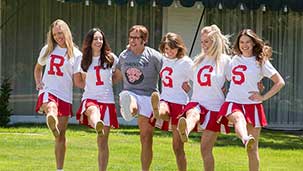You have to admire someone who knows exactly what they are. Today, most people resist labels and resent being categorized in any way. So when a man just flat out calls himself a racist, a homophobe or a chauvinist (like your character who cheers on fellow chauvinist, tennis champion Bobby Riggs), it’s almost refreshing. We can stop dancing around language and start dealing with the issues head on. Or in this case, head-to-head in front of 90 million people.
It is this public spectacle at the centre of Battle of the Sexes that makes the story so special. Two tennis world champions faced off in a match that was both completely meaningless and symbolically life changing. Women’s lib was peaking in the early 70s, with women burning their bras and demanding equal footing in the world. Billie Jean King suddenly found herself in the middle of it all, begrudgingly accepting a challenge from retired tennis star Riggs to play in a money match that would exploit the zeitgeist and turn the winner a pretty profit. It was a story made for Hollywood from Day 1, so it’s pretty shocking it took 40 years to get it to the big screen.
Unfortunately, the film’s politics still resonate decades later. The struggle doesn’t feel quaint in retrospect - but actually wildly progressive and inspiring. Sure, King would probably cower from the mighty swings of today’s female tennis professionals, but the evolution of athletes hasn’t necessarily kept pace with equal rights in general. And in fact, the A-story of Battle of the Sexes is even less about men vs. women as it is straight vs. gay. The closeted relationship King has with her hairdresser is the perfect emotional primer for the story that elevates the stakes in the climactic tennis match to otherwise unreachable heights. Few American athletes have ever had more to gain and/or lose by winning an out-of-competition match.
I was particularly struck by the reactions of people like you in the crowd. It’s easy to side with the women who are cheering on King and hinging unspeakable levels of hope on the result. But it’s the men in the crowd who take advantage of Rigg’s own “playful” use of the term chauvinist (“I’m here to put the show back in chauvinist!”), as well as all the keep-em-in-the-kitchen stereotypes that are Trump-like troubling. Steve Carell may have a much smaller role than Emma Stone in the film, but he brings the perfect amount of charisma and charm to help us see why the press lapped up his media-savvy antics as tongue-in cheek. The problem is, it was less a dog whistle than call-to-arms for otherwise sexist men to flaunt their bigotry, feeling shielded by larger public examples. It is still all too familiar.
If Hillary Clinton had won, the film might have felt like a powerful parallel. Instead, it comes across as a utopian fantasy where guys like you go home with your tail between your legs, instead of resting them on Oval Office furniture. But as escapist fantasy, it’s a hell of a film.
Sincerely,

Christopher







